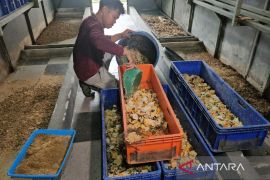"In fact, breakfast is very important to create quality human resources," Prof Dr Ir Hadinsyah, MS of the Bogor Institute of Agriculture (IPB) said at a healthy breakfast campaign at the IPB campus on Sunday.
Based on the results of a basic health research conducted in 2010, the energy and nutrition contribution of the breakfasts of Indonesian children aged between 2 and 12 years reach less than 25 percent of nutrition adequacy rate, he said.
Healthy breakfast contributes at least 25 percent of nutrition intake. On average 50 percent of Indonesian children have healthy breakfasts before going to school, he said.
Meanwhile, the results of a survey conducted by Hardiansyah in 2012 suggest that 26.1 percent of 35,000 children surveyed had breakfasts by drinking water, tea and milk.
"The results of other survey suggest that 44.6 percent of children had low quality breakfasts or the quantity of energy consumption is less than 15 percent of nutrition adequacy rate," he said.
At national level, the health quality and eating habit of school-age children are still low as reflected by the low quality of their breakfasts, he pointed out.
"Based on the results of a research, if school-age children who have undernourishment status do not have a breakfast their cognitive ability will decline," he said.
He said breakfast is important to serve as the pillar of balanced nutrition according to the mandate of the health law of 2009.
The law stipulates that one of the efforts to improve the nutrition of an individual or a group of individuals is providing them with balanced nutrition, he said.
(KR-LR/S012)
Editor: Jafar M Sidik
Copyright © ANTARA 2012











